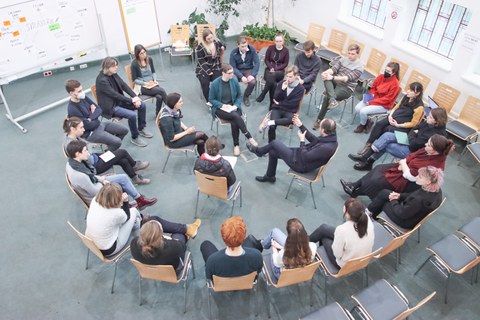Orchestrated networking (incl. DIU and SLUB)
Active exchange and close networking within TU Dresden and with partners contribute to improving the quality of teaching and research in the long term. The identification of common interests and overlapping core research areas creates new points of contact for interdisciplinary cooperation. In addition, the courses offered by all participants are opened up across institutions. This creates a more diverse, more flexible educational offering that is more closely tailored to the individual interests and needs of students and teachers - across institutional boundaries. (see teaching strategy)
What do we want?
TU Dresden is networked between the individual faculties and with related partners such as SLUB and DIU with regard to the development and use of interactive learning/teaching offers, further education opportunities and lifelong learning offers. There is a searchable catalog with offers, credit transfer options and contact persons, which is actively maintained and further developed by all parties involved. (see teaching strategy)
Where do we want to go?
TU Dresden in 2030 sees itself as a networked educational and research space in which cooperation across institutional and disciplinary boundaries is a matter of course. (cf. university development strategy)
Networking opportunities are transparently accessible to all university members. Students, teaching staff and employees are aware of the existing offers and can actively participate in their further development. Structural and financial framework conditions - including rooms and budgets - ensure the long-term establishment of these networking formats (cf. University Development Strategy).
Communities of practice are established as a recognized form of cooperation and are supported technically, organizationally and in terms of time. Large networking groups receive funding on an application basis, results are documented centrally and used to further develop joint practice (see teaching strategy).
Degrees and credits are flexible. Credits from courses and projects at other universities or educational partners (e.g. DIU, SLUB MakerSpace) can be recognized. Teachers regularly agree on content, joint offers are co-financed by corresponding budgets (see teaching strategy).
Interdisciplinary and intercultural exchange is an integral part of everyday university life. Interdisciplinary projects are particularly encouraged and existing networks support professional and cultural diversity. Cooperation with external partners is also structurally anchored (see internationalization strategy).
Supervision and mentoring offer individual support for qualification work. Students and doctoral candidates have access to a wide range of qualified contact persons. Further training courses support professional supervision (cf. university development strategy).
Interprofessional teamwork is standard in teaching and research. Corresponding skills are already promoted during studies through internships, project work or interdisciplinary seminars. Exchange formats are anchored in the curriculum and organization (see teaching strategy).
Flat hierarchies characterize the teaching culture. Students work independently and make use of existing support services. Teachers accompany, advise and design learning spaces together with the students. Mutual appreciation forms the basis of a productive learning environment (see teaching strategy).
How do we achieve this?
- Detailed joint analysis of all stakeholders and interests
- Coordination of structures and responsibilities to implement the necessary organizational, personnel, financial and technical requirements to achieve the above-mentioned state.
- Establish a board to coordinate the implementation measures with all institutions involved and create appropriate framework conditions (resources, legal basis, motivation) to encourage active exchange.
- Take possible barriers seriously: Lack of personnel or financial commitment from one or more participating institutions, possible conflicts of interest with target achievement/resource allocation in other areas
- Prioritize the measure and obtain commitment from both the top organizational level and the employee level.

